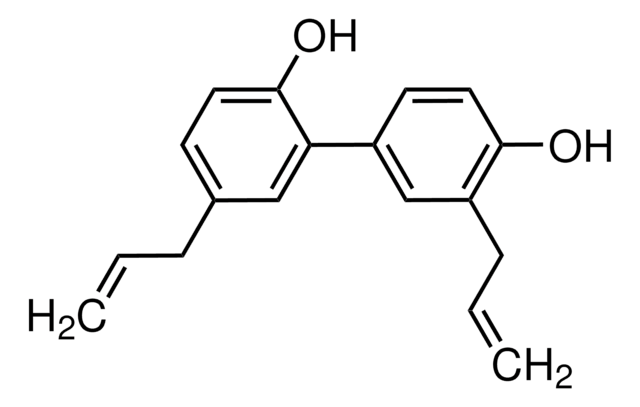324880
(–)-Epigallocatechin Gallate
One of the main polyphenolic constituents of green tea that exhibits potent antitumor, anti-inflammatory, and antioxidant properties.
Synonym(s):
(–)-Epigallocatechin Gallate, EGCG, (2R,3R)-2-(3,4,5-Trihydroxyphenyl)-3,4-dihydro-1[2H]-benzopyran-3,5,7-triol-3-(3,4,5-trihydroxybenzoate), HAT Inhibitor X, Histone Acetyltransferase Inhibitor X, p300/CBP Inhibitor VIII, PCAF Inhibitor V, DNA MTase Inhibitor IV, DNA Methyltransferase Inhibitor IV
About This Item
Recommended Products
Quality Level
Assay
≥95% (HPLC)
form
solid
manufacturer/tradename
Calbiochem®
storage condition
OK to freeze
protect from light
color
faint pink
solubility
water: 5 mg/mL
DMSO: soluble
shipped in
ambient
storage temp.
−20°C
SMILES string
O1[C@@H]([C@@H](Cc4c1cc(cc4O)O)OC(=O)c3cc(c(c(c3)O)O)O)c2cc(c(c(c2)O)O)O
InChI
1S/C22H18O11/c23-10-5-12(24)11-7-18(33-22(31)9-3-15(27)20(30)16(28)4-9)21(32-17(11)6-10)8-1-13(25)19(29)14(26)2-8/h1-6,18,21,23-30H,7H2/t18-,21-/m1/s1
InChI key
WMBWREPUVVBILR-WIYYLYMNSA-N
General description
Biochem/physiol Actions
PMA-induced skin thickening
Packaging
Warning
Reconstitution
Other Notes
Dell′Aicia, I., et al. 2004. EMBO reports 5, 1.
Tachibana, H., et al. 2004. Nat. Struct. Mol. Biol.11, 380.
Naasami, I., et al. 1998. Biochem. Biophys. Res. Commun. 249, 391.
Ahmad, N., et al. 1997. J. Natl. Cancer89, 1881.
Chan, M.M.-Y., et al. 1997. Biochem. Pharmacol. 54, 1281.
Lin, Y.-L., and Lin, J.-K. 1997. Mol. Pharmacol. 52, 465.
Fiala, E.S., et al. 1996. Experientia 52, 922.
Katiyar, S.K., et al. 1995. J. Invest. Dermatol. 105, 394.
Liao, S., et al. 1995. Cancer Lett. 96, 239.
Yamane, T., et al. 1995. Cancer Res. 55, 2081.
Huang, M.T., et al. 1992. Carcinogenesis 13, 947.
Legal Information
Signal Word
Warning
Hazard Statements
Precautionary Statements
Hazard Classifications
Acute Tox. 4 Oral - Aquatic Chronic 2 - Eye Irrit. 2 - Skin Sens. 1
Storage Class Code
11 - Combustible Solids
WGK
WGK 2
Flash Point(F)
Not applicable
Flash Point(C)
Not applicable
Certificates of Analysis (COA)
Search for Certificates of Analysis (COA) by entering the products Lot/Batch Number. Lot and Batch Numbers can be found on a product’s label following the words ‘Lot’ or ‘Batch’.
Already Own This Product?
Find documentation for the products that you have recently purchased in the Document Library.
Customers Also Viewed
Our team of scientists has experience in all areas of research including Life Science, Material Science, Chemical Synthesis, Chromatography, Analytical and many others.
Contact Technical Service















